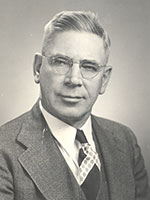 Carl L. Schweppe (1892-1969) holds the singular distinction of being the first homegrown president of Dr. Martin Luther College. Born south of New Ulm and baptized by the college’s first president, Pastor C. J. Albrecht, Carl went through the ranks to become the college’s sixth full-time president, a position he held for 30 years (1936-1966).
Carl L. Schweppe (1892-1969) holds the singular distinction of being the first homegrown president of Dr. Martin Luther College. Born south of New Ulm and baptized by the college’s first president, Pastor C. J. Albrecht, Carl went through the ranks to become the college’s sixth full-time president, a position he held for 30 years (1936-1966).
His Christian education began in St. James, Minnesota, continued in DMLC’s high school department, transitioned to Northwestern College in Watertown, Wisconsin, and culminated at WELS’ Seminary in Wauwatosa.
In 1915, Carl was called to serve his college alma mater in Watertown as the synod’s first tutor and dorm supervisor. For two years he honed his love of English literature and talent for baseball, passions he shared with Northwestern’s athletic director and later president, Erwin E. Kowalke. The friendship served the church body well. When the two men administered the two synodical colleges, they collaborated by constant personal correspondence, with full trust and without additional bureaucracies.
For three years Schweppe gained experience in parish ministry as pastor in Bowdle, South Dakota. While there, he married Flora Oetting, a hometown girl from St. James, and the first of the couple’s three children was born. But Dr. Martin Luther College needed an English professor. So in 1920 the new professor began teaching English literature and indulging his interest in Shakespeare.
The classroom was a fit, and education suited his demeanor. Everyone remembers this tall stately man who got attention by his commanding voice and oratorical eloquence. There was substance; there was conviction. Students loved “Schwap,” as he was affectionately known, for his dignified yet warm and humorous ways. His after-Christmas concert talks became legendary. The students rolled with laughter at his puns and satire on Bach’s contrapuntal fugues.
Through sound judgment he made fans also in the community. The New Ulm Journal marked Schweppe as New Ulm’s Foremost Educator. He served on the police commission and a bank board. His leadership helped the college weather the storms of the Depression and vicissitudes of World War II as a member of the municipal draft board. He oversaw major adjustments to post-war educational changes.
Schweppe liked to quote Hamlet’s advice: “To thine own self be true; thou canst not then be false to any man.” But his last commencement address best summarizes his life’s work in the Lord’s kingdom: “Walk in the Truth!”
Our gratitude to Professor Emeritus Arnold Koelpin for writing this biography and to Professor Emeritus Arthur Schulz for his research on the DMLC presidents.



